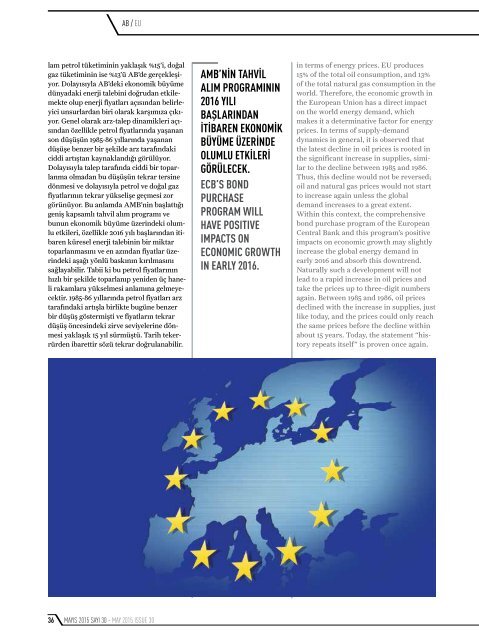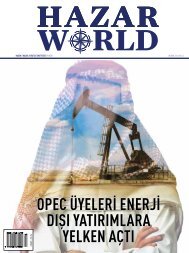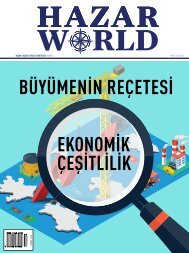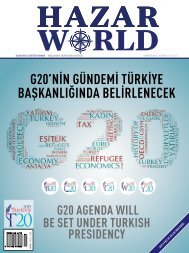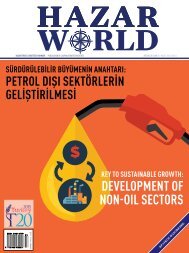Hazar World - Sayı:30 - Mayıs 2015
You also want an ePaper? Increase the reach of your titles
YUMPU automatically turns print PDFs into web optimized ePapers that Google loves.
AB / EU<br />
lam petrol tüketiminin yaklaşık %15’i, doğal<br />
gaz tüketiminin ise %13’ü AB’de gerçekleşiyor.<br />
Dolayısıyla AB’deki ekonomik büyüme<br />
dünyadaki enerji talebini doğrudan etkilemekte<br />
olup enerji fiyatları açısından belirleyici<br />
unsurlardan biri olarak karşımıza çıkıyor.<br />
Genel olarak arz-talep dinamikleri açısından<br />
özellikle petrol fiyatlarında yaşanan<br />
son düşüşün 1985-86 yıllarında yaşanan<br />
düşüşe benzer bir şekilde arz tarafındaki<br />
ciddi artıştan kaynaklandığı görülüyor.<br />
Dolayısıyla talep tarafında ciddi bir toparlanma<br />
olmadan bu düşüşün tekrar tersine<br />
dönmesi ve dolayısıyla petrol ve doğal gaz<br />
fiyatlarının tekrar yükselişe geçmesi zor<br />
görünüyor. Bu anlamda AMB’nin başlattığı<br />
geniş kapsamlı tahvil alım programı ve<br />
bunun ekonomik büyüme üzerindeki olumlu<br />
etkileri, özellikle 2016 yılı başlarından itibaren<br />
küresel enerji talebinin bir miktar<br />
toparlanmasını ve en azından fiyatlar üzerindeki<br />
aşağı yönlü baskının kırılmasını<br />
sağlayabilir. Tabii ki bu petrol fiyatlarının<br />
hızlı bir şekilde toparlanıp yeniden üç haneli<br />
rakamlara yükselmesi anlamına gelmeyecektir.<br />
1985-86 yıllarında petrol fiyatları arz<br />
tarafındaki artışla birlikte bugüne benzer<br />
bir düşüş göstermişti ve fiyatların tekrar<br />
düşüş öncesindeki zirve seviyelerine dönmesi<br />
yaklaşık 15 yıl sürmüştü. Tarih tekerrürden<br />
ibarettir sözü tekrar doğrulanabilir.<br />
AMB’NIN TAHVIL<br />
ALIM PROGRAMININ<br />
2016 YILI<br />
BAŞLARINDAN<br />
ITIBAREN EKONOMİK<br />
BÜYÜME ÜZERİNDE<br />
OLUMLU ETKİLERİ<br />
GÖRÜLECEK.<br />
ECB’S BOND<br />
PURCHASE<br />
PROGRAM WILL<br />
HAVE POSITIVE<br />
IMPACTS ON<br />
ECONOMIC GROWTH<br />
IN EARLY 2016.<br />
in terms of energy prices. EU produces<br />
15% of the total oil consumption, and 13%<br />
of the total natural gas consumption in the<br />
world. Therefore, the economic growth in<br />
the European Union has a direct impact<br />
on the world energy demand, which<br />
makes it a determinative factor for energy<br />
prices. In terms of supply-demand<br />
dynamics in general, it is observed that<br />
the latest decline in oil prices is rooted in<br />
the significant increase in supplies, similar<br />
to the decline between 1985 and 1986.<br />
Thus, this decline would not be reversed;<br />
oil and natural gas prices would not start<br />
to increase again unless the global<br />
demand increases to a great extent.<br />
Within this context, the comprehensive<br />
bond purchase program of the European<br />
Central Bank and this program’s positive<br />
impacts on economic growth may slightly<br />
increase the global energy demand in<br />
early 2016 and absorb this downtrend.<br />
Naturally such a development will not<br />
lead to a rapid increase in oil prices and<br />
take the prices up to three-digit numbers<br />
again. Between 1985 and 1986, oil prices<br />
declined with the increase in supplies, just<br />
like today, and the prices could only reach<br />
the same prices before the decline within<br />
about 15 years. Today, the statement “history<br />
repeats itself” is proven once again.<br />
36 MAYIS <strong>2015</strong> SAYI <strong>30</strong> - MAY <strong>2015</strong> ISSUE <strong>30</strong>


